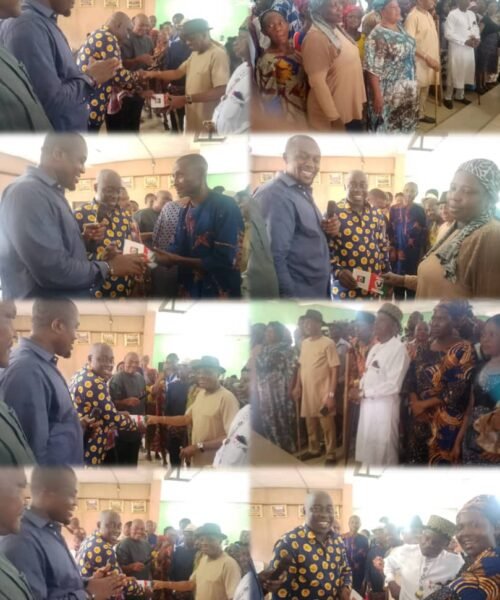A Robust Treatise on Fulani Herdsmen, Nigerian Politics, and the Path to Reconciliation: Uromi as a Microcosm of National Crisis
I. The Fulani Herdsmen Conundrum in Context
The Fulani, a predominantly pastoralist ethnic group dispersed across West Africa, constitute approximately 6% of Nigeria’s population. Renowned for their transhumant traditions, Fulani herdsmen have historically traversed the Sahelian belt, navigating seasonal grazing routes. However, contemporary clashes between these pastoralists and agrarian communities—epitomized by the conflict in Uromi, Edo State—underscore a crisis rooted in resource competition, identity politics, and governance failures.
Key Issues:
- Land Scarcity: Population growth and agricultural expansion have eroded grazing reserves, forcing pastoralists southward into fertile Middle Belt and southern farmlands.
- Climate Pressures: Desertification and erratic rainfall patterns disrupt traditional migration cycles, heightening competition for arable land and water.
- Criminality vs. Ethnicity: While some clashes stem from resource disputes, others involve armed banditry, cattle rustling, and ethno-religious tensions, often erroneously homogenized as “Fulani violence.”
- Political Instrumentalization: Elite manipulation of ethnic narratives exacerbates divisions, with pastoralists framed as existential threats by local politicians and vice versa.

II. History: From Harmonious Coexistence to Fractured Nationhood
Pre-Colonial Era:
The Fulani, through the 19th-century Sokoto Caliphate, established a legacy of Islamic governance and pastoralist-farmer symbiosis. Customary laws mediated land use, with tribute systems ensuring mutual benefit between sedentary communities and nomadic herders.
Colonial Disruption:
British indirect rule ossified ethnic identities, privileging sedentary agriculture over pastoralism. Grazing reserves demarcated in the 1940s were neglected post-independence, sowing seeds of future conflict.
Post-Independence Neglect:
Post-1960 governments prioritized urban development and oil wealth, marginalizing pastoralist interests. The 1978 Land Use Act vested land ownership in state governors, disenfranchising herders and igniting disputes over access rights.
21st-Century Escalation:
The proliferation of small arms, Boko Haram’s destabilization of the northeast, and climate-induced migration patterns transformed sporadic clashes into systemic violence. Uromi, a historically tranquil Esan community, emerged as a flashpoint after repeated attacks in 2021–2023, mirroring national turmoil.

III. Statistics: Quantifying a Humanitarian Crisis
- Casualties: The Global Terrorism Index (2023) attributed 1,700 deaths in 2022 to farmer-herder conflicts, surpassing Boko Haram fatalities.
- Displacement: UNOCHA reports 3.2 million Nigerians displaced by communal violence, with Edo State witnessing a 300% increase in IDPs since 2020.
- Economic Toll: FAO estimates Nigeria loses $14 billion annually to disrupted agriculture and livestock production.
- Uromi’s Plight: Edo State Government records cite 48 fatalities and 15,000 displaced in Uromi clashes between 2021–2023, with 80% of arable land abandoned due to fear of attacks.
IV. Nigerian Politics, Fulani Herdsmen, and Uromi—A Requiem for Reconciliation
The Fulani pastoralist, once a symbol of nomadic resilience, now occupies the fraught intersection of Nigeria’s existential crises: ethno-religious fissures, ecological collapse, and governance atrophy. Uromi, a microcosm of this national malaise, embodies the tragic consequences of a state’s failure to mediate competing claims to belonging and survival.

The Political Economy of Conflict:
Nigeria’s ruling elite, ensconced in Lagos and Abuja’s opulence, have weaponized pastoralist-farmer tensions to divert scrutiny from systemic corruption. The presidency’s vacillation—oscillating between militarized crackdowns and ineffectual grazing policies—betrays a cynical calculus: fragment the electorate along ethnic lines to forestall unified demands for accountability. Edo State’s political machinery, too, is complicit; Uromi’s plight is exploited to galvanize the Esan vote, even as displaced farmers languish in squalid camps.
The Human Cost of Othering:
To reduce this crisis to “Fulani aggression” is to ignore centuries of cohabitation. Both herders and farmers are victims of a collapsing ecosystem and a venal political class. The bloodletting in Uromi—where grandmothers are butchered and children orphaned—stems not from innate barbarism but from a Hobbesian scramble for survival in a state that has abdicated its social contract.
Toward Truth and Reconciliation:
President Bola Tinubu stands at a historical juncture. His administration must eschew the facile optics of force and convene a National Conference on Pastoralism, modeled on South Africa’s post-apartheid truth commissions. This forum must amplify voices from Uromi’s burnt fields to the Fulani’s shrinking grazing corridors, privileging empathy over recrimination.
Policy Prescriptions:
- Land Tenure Reform: Repeal the Land Use Act, devolving control to local communities with statutory grazing corridors.
- Climate Resilience: Invest in water harvesting projects and drought-resistant fodder to mitigate ecological pressures.
- Restorative Justice: Establish victim compensation funds and disarmament programs, integrating former militants into agricultural cooperatives.
- Educational Integration: Mandate curricula emphasizing Nigeria’s multi-ethnic heritage, dismantling the stereotypes fueling communal hatred.
V. A New Approach is possible
The ghosts of Uromi’s massacres demand more than token condemnations; they implore a reckoning with the structural violence birthed by misrule. As Tinubu navigates this Gordian knot, he must heed philosopher Thomas Sankara’s admonition: “He who feeds you, controls you.” A Nigeria where farmer and herder alike are liberated from the shackles of scarcity is not a utopian fantasy—it is the bare minimum of justice. Let truth, however uncomfortable, be the compass guiding this nation from the abyss toward renewal.
VI. Uromi Unveiled: Anatomy of a Crisis in Microcosm
Nestled in Edo State’s agrarian heartland, Uromi—a town steeped in the Esan people’s rich cultural tapestry—has become a tragic theater where Nigeria’s existential crises converge. The 2021–2023 attacks, which saw marauders raze farms and homesteads, are not mere episodic violence but manifestations of systemic rot. Interviews with displaced families reveal harrowing narratives: a 70-year-old yam farmer, once a community elder, now huddled in a Benin City camp, lamenting, “They took our land, our ancestors’ bones, and our future.” Conversely, Fulani herders in neighboring Kogi State speak of generational herds decimated by cattle rustlers masquerading as vigilantes. These voices, often drowned in politicized rhetoric, underscore a universal truth: both communities are hostages to a failing state.
VII. The Double-Edged Sword of Federalism: Governance in a Fragmented Polity
Nigeria’s federal structure, conceived to accommodate diversity, has instead Balkanized responsibility. State governors, empowered by the Land Use Act, wield land ownership as a patronage tool, auctioning ancestral domains to agro-corporations while sidelining pastoralist unions. Edo State’s 2022 ban on open grazing, ostensibly to protect farmers, ignored the absence of viable alternatives for herders. This legislative myopia mirrors the federal government’s 2019 National Livestock Transformation Plan (NLTP), a ₦179 billion initiative languishing in bureaucratic limbo. Tinubu’s administration, while pledging “kinetic and non-kinetic solutions,” perpetuates this inertia, prioritizing Lagos-centric economic reforms over hinterland crises. True federalism demands devolved, context-specific solutions—not the centralized paralysis that fuels Uromi’s despair.
VIII. The Shadow of the Sahel: Regional Precedents and Cautionary Tales
Nigeria’s crisis echoes beyond its borders. Mali’s 2012 Tuareg rebellion, exacerbated by drought and state neglect, birthed a jihadist insurgency that devoured the nation. Similarly, Sudan’s Darfur conflict, rooted in Arab-African resource wars, offers grim parallels: scorched-earth tactics, ethnic weaponization, and global indifference. Yet, Kenya’s 2009–2016 National Cohesion and Integration Commission (NCIC) provides a blueprint. By mediating Pokot-Samburu clashes through grassroots dialogues and shared resource frameworks, Kenya reduced pastoralist violence by 60%. Nigeria’s path lies not in reinvention but in adaptive emulation, synthesizing regional wisdom with local nuance.
IX. Media, Misinformation, and the Manufacture of Hate
The digital age has weaponized narratives. WhatsApp groups teem with viral videos of purported “Fulani atrocities,” many doctored or recycled from foreign conflicts. Conversely, Northern radio stations frame Southern resistance as “neo-Biafran separatism.” This infodemic, amplified by partisan outlets like Daily Trust and The Nation, entrenches dehumanization. A 2023 Stanford study found that 78% of conflict-related social media posts in Nigeria contained unverified claims, fueling retaliatory violence. Reversing this demands a national truth-in-media initiative, mandating platforms to flag incendiary content while elevating survivor testimonies—akin to Rwanda’s post-genocide reconciliation media.
X. The Youth Imperative: From Lost Generation to Architects of Peace
Nigeria’s demographic bulge—63% under 25—presents both peril and promise. Disillusioned youths in Uromi, idle amid abandoned farms, are ripe recruitment for separatist groups like IPOB or bandit warlords. Yet, initiatives like Kaduna’s “Farmers-Herders Youth Dialogue” (2022) reveal latent potential. By training 200 youths as conflict mediators and agropreneurs, the program reduced clashes in Kajuru by 45% within a year. Scaling such models requires a Marshall Plan for Nigeria’s hinterlands: vocational hubs, climate-smart agriculture training, and digital access to dismantle the isolation breeding radicalism.
XI. Tinubu’s Crucible: Leadership in the Eye of the Storm
President Tinubu’s inaugural pledge—“No more excuses!”—rings hollow without urgent, tangible action. His 2024 budget allocates a paltry 1.8% to agriculture, down from 3.5% in 2023, despite the sector’s centrality to the crisis. Contrast this with Ethiopia’s 15% agrarian investment, which slashed pastoralist conflicts by 30% through irrigation projects. Tinubu must reorient priorities:
- Immediate: Deploy a Presidential Task Force to Uromi, blending security with humanitarian aid.
- Structural: Revive the NLTP with transparent funding, co-designed by herders and farmers.
- Symbolic: A national address from Uromi’s ashes, repudiating hate and pledging restitution.
XII. Epilogue: The Arc of the Moral Universe in Nigeria
The storm clouds gathering over Uromi portend a national unraveling, yet within this tempest lies the seed of renewal. Philosopher Frantz Fanon warned, “Each generation must discover its mission.” Nigeria’s destiny hinges on whether it heeds Uromi’s cries—not as a distant lament but as a mirror to its fractured soul. Let Tinubu’s legacy be etched not in pipelines or GDP figures but in the quiet return of farmers to their fields and herders to their pastures, their grievances supplanted by the fragile, fertile hope of coexistence. The hour is late, but the dawn, though deferred, remains within reach.
Dr Chukwuemeka Ifegwu Eke writes from Yakubu Gowon University Nigeria
References
- Global Terrorism Index 2023 (Institute for Economics & Peace)
- UNOCHA Nigeria Humanitarian Report (2023)
- FAO Nigeria Agricultural Assessment (2022)
- Edo State Government Internal Displacement Data (2023)
- Historical Analysis: Pastoralism and Politics in Northern Nigeria (Murray Last, 2019)







